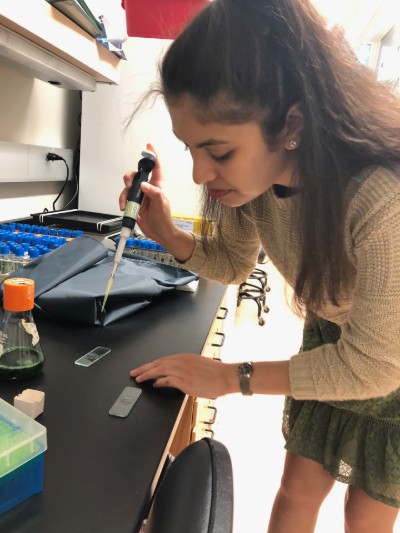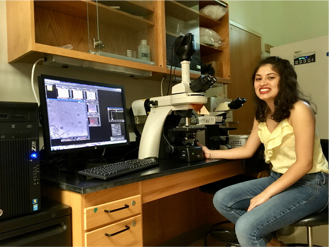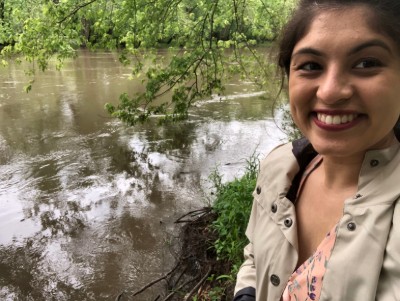Ria Samir Patel - Biology Research Project
Name: Ria Samir Patel
Class: 2021
Major: Biology
Hometown: Springfield, Illinois
Name of research project: Discovery and Characterization of New Cyanophages: A Biological Solution to the Increasing Problem of Cyanobacterial Blooms
Name of faculty research mentor: Richard Alvey
Name of research grant: State Farm Innovation Summer Research Fellowship

Research Summary: Phages, viruses that infect bacteria, are the most populous biological entities on Earth. They replicate by injecting their DNA into a bacterial cell and manipulating it to produce more phage particles until the cell lyses. While they have been known to science for just over 100 years now, they have remained severely understudied. Recent advances that have allowed DNA sequencing technologies to become more affordable and more accessible are now permitting researchers to explore this huge new realm of biology. Unlike the host cells they infect, phage genomes have a much more manageable size, which makes them an elegant option for studying evolution on a smaller scale. Just as each human has DNA-encoded characteristics that individualize them, each new phage has qualities that make it unique and fascinating to study. For this summer project, I am proposing to study the phages that infect freshwater cyanobacteria. Freshwater cyanophages (phages that target cyanobacteria) are of great interest to the biological community because of their role in helping to maintain water quality. While cyanobacteria are a naturally occurring component of both marine and freshwater environments, cyanobacterial blooms can create many complications within aquatic ecosystems. These blooms are the result of eutrophication, a process in which excess nutrients in a body of water causes negative effects on aquatic life. In conjunction with eutrophication, these blooms are occurring more frequently due to the longer warmer growing seasons brought about by global climate change. Effects of these cyanobacterial blooms include reduced transparency of water for plants and other organisms that require photosynthesis, a decrease in the amount of O 2 , and increased acidity and toxin production in freshwater. The Environmental Protection Agency warns of warmer water temperatures creating ideal conditions for cyanobacterial blooms to grow both faster and thicker . All of these elements change the normal atmosphere in which the aquatic life has evolved and become accustomed to inhabiting. My proposal explores how we can combat this problem with discovery and isolation of cyanophages.

How has Illinois Wesleyan prepared you for conducting research?
The Science Education Alliance- Phage Hunters Advancing Genomics and Evolutionary Science, commonly known as SEA-lab is a laboratory section offered to some biology majors their freshman year. This lab provided me with knowledge, understanding, and practice with isolating phages in general. It also gave the chance to work with bioinformatic programs that allow microbiologists to annotate genomes of phages.
What do you hope to gain from this experience as you look forward to your future?
Illinois Wesleyan’s annual theme this last year was “Changing Climates.” This theme brings attention to the environmental changes that are occurring around the world. Unfortunately, many of these changes are created by human behavior. Downstream effects of fertilizers and longer, warmer growing seasons create ideal breeding conditions for cyanobacterial blooms. It is our duty in the biological community to help with solutions to these impacts of climate change. Research and isolation of freshwater cyanophages will allow me to “investigate the changing climates around us” and “engage in the active project of changing climates”.

What’s been your favorite part of conducting research so far?
My favorite part about research has been using microscopes to see the fluorescent characteristic of cyanobacteria. I have also enjoyed naming the phages I discovered after two of my role models. Cyanophage Ginsburg was named after Chief Justice Ruth Bader Ginsburg, and cyanophage Gandhi was named after Mahatma Gandhi.
In your opinion, why is it important for undergraduate students to participate in research opportunities?
Participating in research is a great way for undergraduates to practice problem solving and gain a different perspective on what they are studying in their textbooks. It is easy to forget how significant discoveries and scientists are that we read about in our textbooks. When you put in the work to create and do your own research, you learn to have a greater appreciation for the information you learn about.
